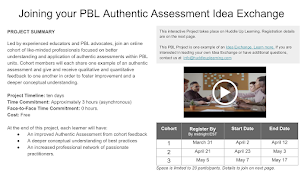We're excited to announce three new cohorts open to educators wanting to improve their practice around creating Authentic Assessments within PBL units. These are collaborative learning experiences - and best of all, they're free!
- Share practices, including resources from Jay Mctighe, PBL Works, and Project ARC
- Users share lesson plans based on best practice.
- Users exchange feedback to help each other (and the cohort) improve.
Each cohort is limited to 20 participants. Learn more about what makes the PBL Idea Exchange an innovative way that cohorts can collaborate and learn together.
You can learn more details about joining a cohort here or by clicking the image.
These cohorts are the first part of an innovative experiment we call the Idea Exchange Projects. You can learn more about our Idea Exchange concept here.


Comments
Post a Comment